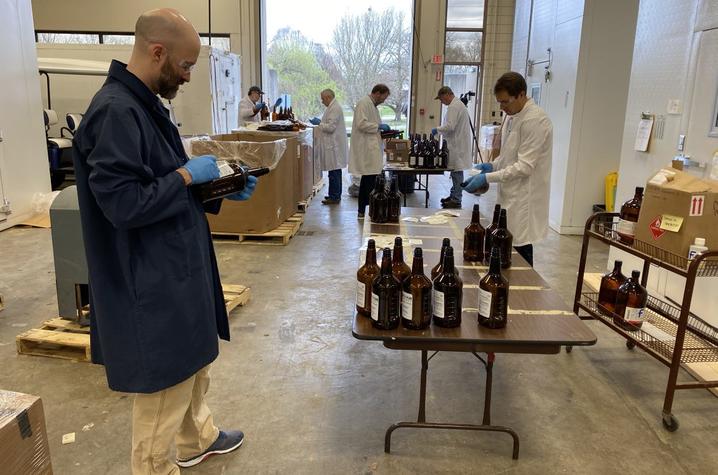UK’s James B. Beam Institute Providing Sanitizer to Health Care Workers, Manufacturing Instructions to Spirits Industry
Video produced UK Agricultural Communications. To view captions for this video, push play and click on the CC icon in the bottom right hand corner of the screen. If using a mobile device, click on the "thought bubble" in the same area.
LEXINGTON, Ky. (April 1, 2020) — The COVID-19 pandemic is creating shortages of sanitizing products in hospitals. Across the nation, spirits distillers are stepping up to help and using their products and equipment to make hand sanitizer for health care workers. At the University of Kentucky, The James B. Beam Institute for Kentucky Spirits is making sanitizer and going a step further by creating an instructional video for distillers who want to do the same.
“There is a method that has evolved over the past few weeks using high-proof ethanol and glycerin,” said Seth DeBolt, director of the Beam Institute and horticulture professor in the UK College of Agriculture, Food and Environment. “We have had requests for sanitizer just within the university and also questions from craft distillers who are interested in producing it. The Food and Drug Administration regulations are very exact, and it’s very important to carefully follow them.”
Beam Suntory donated 250 gallons of high-proof ethanol, and Alltech donated glycerin. The Beam Institute team combined the ingredients in the proper ratios, added water to help the glycerin become more pourable and added a commercial-grade hydrogen peroxide solution. The mixture yielded about 300 gallons of sanitizer.
The multidisciplinary Beam Institute is naturally suited for projects of this nature, with experts in biotechnology, chemistry and engineering involved from across the university.
“We have some amazing colleagues over there at the hospital who are on the front lines of this virus fight, and we have this whole other collection of faculty who can get together and support efforts like this,” DeBolt said. “It’s a fine example of what a land-grant university can do.”
Bert Lynn, chemistry professor in the UK College of Arts and Sciences, was part of the project.
“The end product is a little different from what you normally think of as hand sanitizer,” he said. “It has a more water-like consistency. It has a strong smell. But it’s a product you can effectively work into your hands. It will cut down virus transmission, and the makeup is all FDA approved.”
Maintaining social distance in the production process was a big priority for the team. Lynn said they were constantly checking their positions and making sure they were far enough apart.
“It’s a challenge for scientists to work that way, but we did it and still got the work done,” he said. “I was glad to have the opportunity to pitch in and do something that has immediate benefit in this fight against the virus at UK’s hospital.”
Brad Berron, professor of chemical engineering for the UK College of Engineering, led the sanitizer formulation and worked with distilleries on FDA regulations to make sure the product was of the highest quality.
“It is heartwarming to see everyone pitch in on this effort,” he said. “Our team is always looking for ways to serve Kentucky, and we are fortunate to be in a position to help here. We are now working with other local distilleries to help them change over to hand sanitizer production."
DeBolt said he was amazed by the cooperation of so many university and industry partners to get this done in such a timely way.
“I am humbled by our partnership with Beam Suntory and how focused they were in making this successful,” he said. “They sent us a semitruck to deliver product on very short notice. The people in health care are really the ones directly fighting the virus, but if we can make their job easier and help save their lives, or protect them in some small way, it’s something we just have to do.”
Students and faculty in UK College of Pharmacy are doing their part to help, too. Several people worked to put the sanitizer into useable containers for the healthcare system to address shortages.
"Jim Beam and UK HealthCare need to be recognized for their efforts and supplies," Clark Kebodeaux, an associate professor in the College of Pharmacy, said. "We are just happy to help provide assistance with our students."
Students and faculty made sure to socially distance themselves while they worked.
Alex Nilges, a student in the College of Pharmacy, credits her training for being able to help in a time of need.
"I think it's important that we use our resources to really focus on getting critical supplies to those who need it most," she said. "Pharmacists and student pharmacists are particularly equipped to prepare and process compounds like this. It makes me proud to be a part of Team Kentucky."
After a 72-hour mandatory wait time between production and delivery, the team will donate the demonstration batch to UK Albert B. Chandler Hospital.
The instructional video will be available soon and interested distillers can visit the Beam Institute website or contact Brad Berron for more information.

As the state’s flagship, land-grant institution, the University of Kentucky exists to advance the Commonwealth. We do that by preparing the next generation of leaders — placing students at the heart of everything we do — and transforming the lives of Kentuckians through education, research and creative work, service and health care. We pride ourselves on being a catalyst for breakthroughs and a force for healing, a place where ingenuity unfolds. It's all made possible by our people — visionaries, disruptors and pioneers — who make up 200 academic programs, a $476.5 million research and development enterprise and a world-class medical center, all on one campus.




